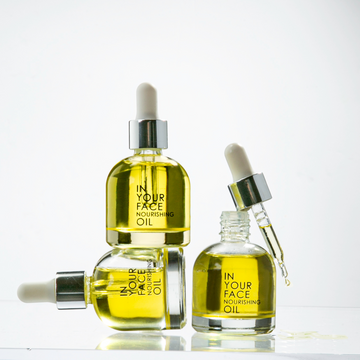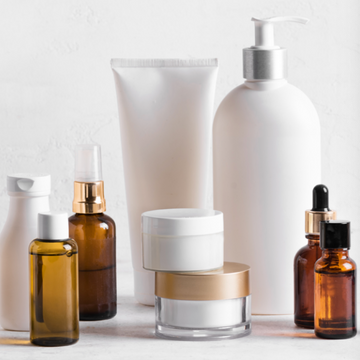
There are a number of myths around facial oil that can, unfortunately, discourage people from trying it. You may have grown up perceiving oil as your skin’s enemy. Oils do not get the proper love and attention they deserve.
We’re going to debunk the most common myths when it comes to using facial oils in your skincare routine.
Myth #1: Facial Oils Are Only for Mature Skin
What facial oils do is mimic the naturally occurring lipids (fatty acids) present in the skin and offer antioxidants, slow down aging, repair the skin and neutralize free radicals.
Younger skin types also benefit from products that repair the skin barrier. Facial oils keep the outermost layer of skin fortified against high temperatures and environmental pollutants.
Myth #2: Facial Oils can cause breakouts
One of the symptoms of acne-prone skin is overactive oil production. However, this doesn’t mean that all oils are going to worsen your acne. Acne-prone skin can benefit greatly from the antimicrobial and antibacterial properties present in oils such as jojoba or frankincense.
One of the triggers for overactive oil production is actually dry and stripped skin, so the addition of facial oils to your skincare regime can help balance your natural oil production, thus minimizing acne. Many face oils also have anti-inflammatory properties which can reduce the redness and irritation that comes with acne.
Naturally-derived oils aren’t responsible for breakouts—comedogenic oils, synthetic oils or mineral oils can be the culprit.

Myth #3: You Shouldn’t Use a Moisturizer AND Facial Oil
Since moisturizers and facial oils are both used to add hydration, they’re often looked at as “one or the other”. But in reality, they are completely different products with different functions, and can be combined for maximum benefits. Facial oils are concentrated products made entirely of plant derived lipids, whereas moisturizers combine plant oils with water and other active ingredients.
Water in moisturizer helps to hydrate skin, but without adequate oil-based protection, the water in moisturizer will simply evaporate from the skin. This is where facial oil comes in. When you apply an oil over a moisturizer, the oil creates a protective barrier around your epidermis, preventing water and other active ingredients from evaporating, and preventing toxins from infiltrating skin.
Facial oils and moisturizer play well together.
Myth #4: Facial Oils Can Replace Serum in Your Routine
Although facial oils and facial serums are both highly concentrated products, they have different functions and compositions, and can be smartly combined for maximal results.
Serums are formulated to be small in size molecularly which increases their ability to penetrate to the deepest layers of skin. Serums combine water with antioxidants, vitamins, sometimes resurfacing ingredients like glycolic acid, and active ingredients like peptides, which increase collagen production.
On the other hand, facial oils are entirely made up of lipids (fatty acids), which help fortify your skin’s moisture barrier, prevent toxins and protect the skin from environmental damage which can wreak havoc on your skin’s topmost layers.
The bottom line? Facial oils are an important part of a daily skin routine for all ages and skin types. When strategically combined with other products, they’ll leave you with healthy, vibrant, and nourished skin.
Myth #5: Face oils are all the same
Not all oils are created equal. In your quest for the right face oil for you, it’s important to read the labels. You want ingredients which are natural, and ideally organic. Avoid synthetic oils, artificial fillers, additives, synthetic fragrances, or basically any ingredient you can’t pronounce. These are the chemicals, colors, fillers and preservatives that could clog or irritate your skin.
According to Cleveland Clinic dermatologist Dr. Jennifer Lucas: "While they're predominantly known for their hydrating properties, face oils can also aid your anti-aging routine and provide antibacterial and healing properties.”









